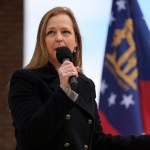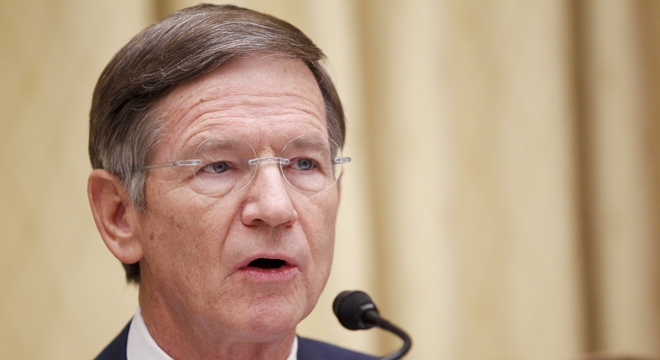At this rate, the “Stop Online Piracy Act” isn’t going to be passed any time soon.
Four hours into the second hearing on the controversial anti-piracy bill, the bill’s primary architect and the hearing’s leader, House Judiciary Committee Chair Lamar Smith (R-TX) admitted temporary defeat, calling a recess at just before 2 pm ET.
At that point, only the first four of about 60 amendments to SOPA had been debated, and only two accepted by lawmakers, including the one Smith himself introduced that would narrow the definitions of websites that could be blocked under the bill. If this pace continues, the markup hearing will last several days.
Ahead of the hearing, Smith released a statement saying the bill had “broad bipartisan support,” but admitted that it could be a lengthy fight to get it passed.
“[W]hile I am hopeful that the bill will be approved on Thursday, the committee is prepared to extend the markup into Friday,” Smith said, Politico reported.
The slow pace of the markup hearing is arguably worse for SOPA supporters, including Hollywood and the AFL-CIO, as opposition is likely to mount the longer the hearing drags on.
The House Judiciary Committee needs to vote to move the bill out of committee and to the entire House floor for a vote before it can take another step towards passage.
A coalition of opponents of the bill, including Google, Facebook and Demand Progress, were hoping to kill SOPA in the cradle and avoid the hearing in the first place by encouraging constituents to flood Congress with calls against it.
Now that the markup hearing is underway, SOPA opponents best hope is getting enough members of Congress to move against it, introducing amendments and motions to slow the process down, which is precisely what they’re trying to do.
Rep. Zoe Lofgren (D-CA), one of the House’s leading critics of SOPA, forced a full reading of all 70 pages of Smith’s amendement , which occupied the first hour of the hearing.
“The public doesn’t know in many cases what’s even in this amendment,” Lofgren said, “We’ve only had one hearing, with only one witness present in opposition. We ought to have a hearing on the amendment.”
Nonetheless, after the reading of of Smith’s amendment, the House voted unanimously to accept it, despite the fact that numerous critics of the legislation don’t believe it does enough to address their concerns that the bill is fundamentally flawed and could resulted in the forced, prolonged shutdown of law-abiding websites and small businesses.
Another amendment designed to exclude U.S. websites operating under U.S. jurisdiction from SOPA’s domain was briefly introduced by Rep. Steve King (R-IA) then quickly withdrawn after other members raised questions about whether the definition was too narrowly drawn.
Rep. Jared Polis (D-CO), the only member of Congress present at the hearing with any tech experience, having founded several web companies, introduced two amendments: one to exclude universities and non-profits from being subject do having to shut down their own domain servers if accused of piracy under SOPA, and the other to exempt dynamic IP addresses, such as those found on web-enabled printers. Both were voted down.
Polis pointed out that SOPA and Smith’s amendment already excluded certain operators of sub-domains, such as GoDaddy.com, from being subject to shutdowns under SOPA.
“If companies like GoDaddy.com are exempt, why aren’t non-commercial domain servers exempt?” Polis asked.
Polis also pointed out that the House’s own sub-domain servers could also be subject to shutdown if they were the accused of copyright infringement.
Rep. Mel Watt (D-NC), one of the bill’s most vociferous defenders, countered that Polis’s exemption would essentially give universities and non-profits immunity from copyright-infringement claims.
“If they are stealing my property, they shouldn’t be allowed to do it,” Watt said. “It doesn’t matter if they’re a university, a non-profit, or whoever. If we were doing it in the House, it still wouldn’t be legal. Give me break!”
Watt, who openly admitted he was an “old-fashioned guy,” earlier compared the Internet to Las Vegas, saying there were some who thought that it should remain essentially lawless “what goes on there stays there,” but that it should be treated more like a “pawn shop” and subject to raids from law enforcement.
Over and over again, opponents of the bill repeated the phrase that at the very least, the bill “wasn’t ready for prime time,” because it hadn’t included the input of technical experts, let alone addressed their complaints or concerns, and that there was no reason to rush it through the House.
Still, Rep. Hank Johnson (D-GA), pointed out another reason for urgency.
“The House feels like it’s time to get something done, before we enter into election season,” Johnsons said. “That’s a legitimate political concern.”
However, he added: “I’m troubled we are making a decision without adequate data,” and said “haste makes waste.”
Broadly speaking, SOPA would give the U.S. Justice Department the power to seek court orders forcing U.S. websites and payment companies to cut off all ties with foreign-based domains accused of hosting pirated content.
The hearing started-up again at 3:00 pm ET. Stay tuned.
Correction: This article originally misattributed the quotes about “old-fashioned guy” and regulating the Internet like a “pawn shop” to Rep. Jared Polis (D-CO), when in fact, they were said by Rep. Mel Watt (D-NC). Thanks to a reader, the error was brought to our attention and has since been corrected. We regret it.









